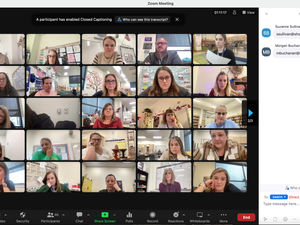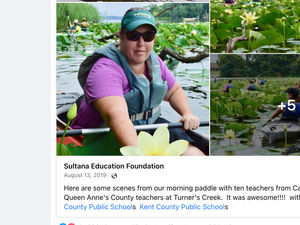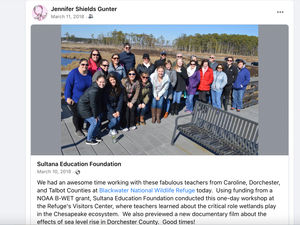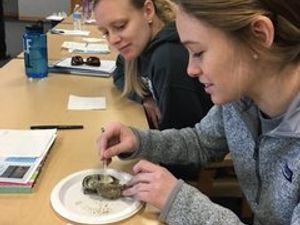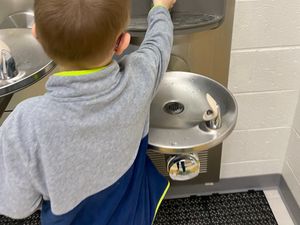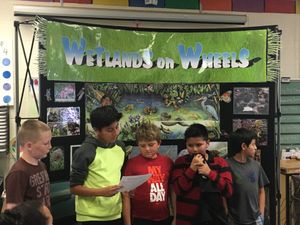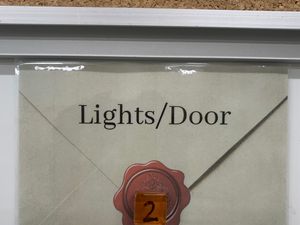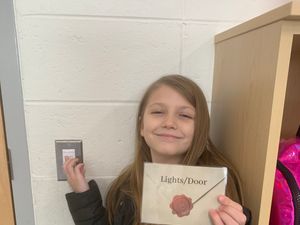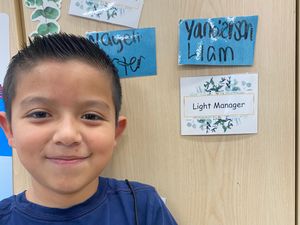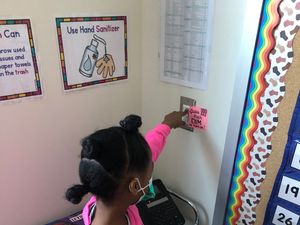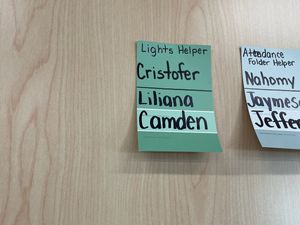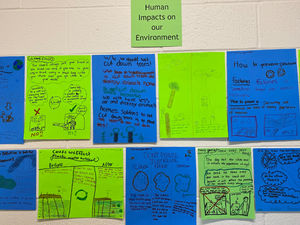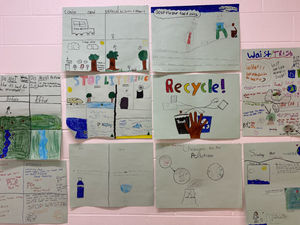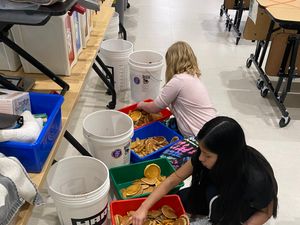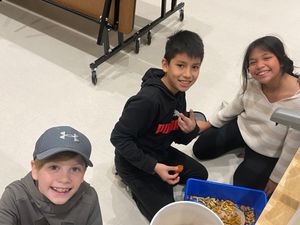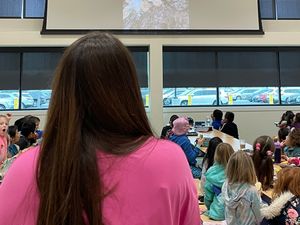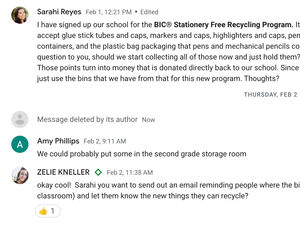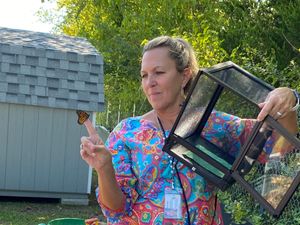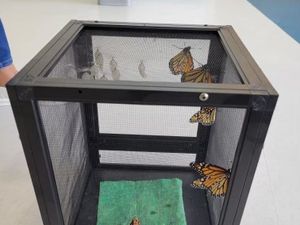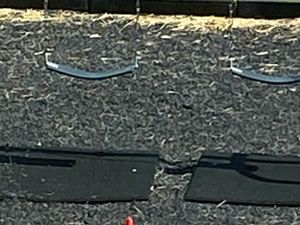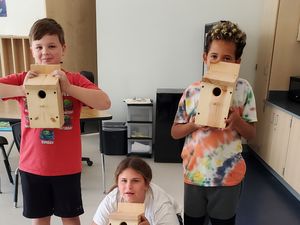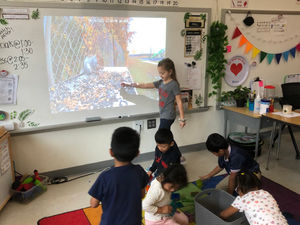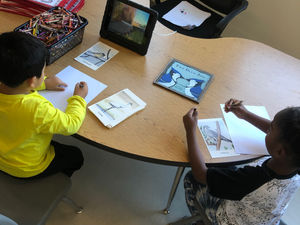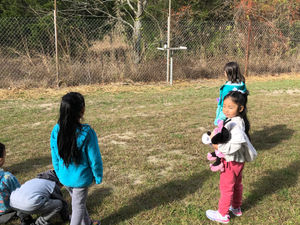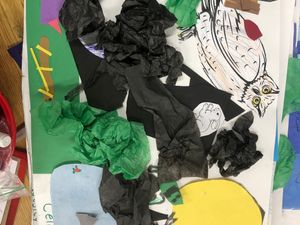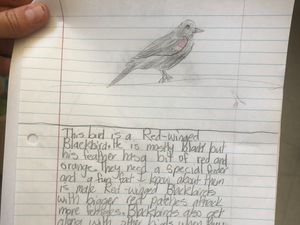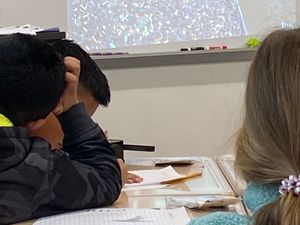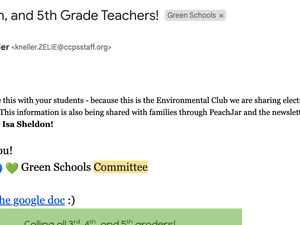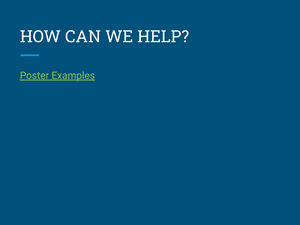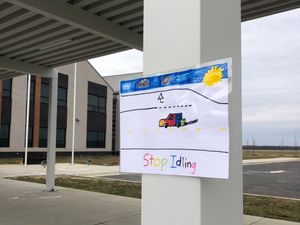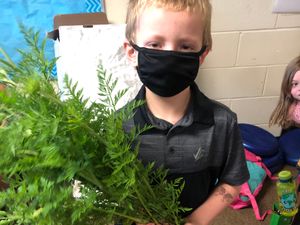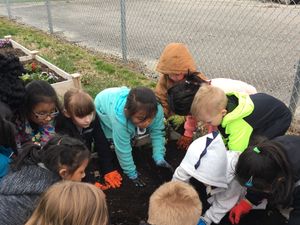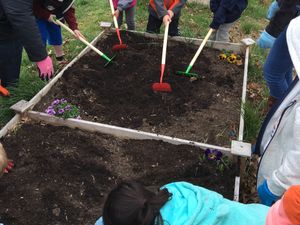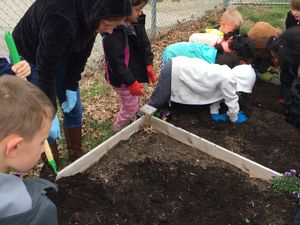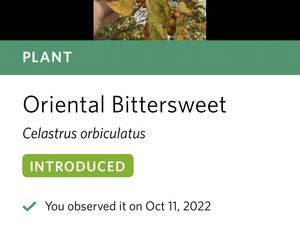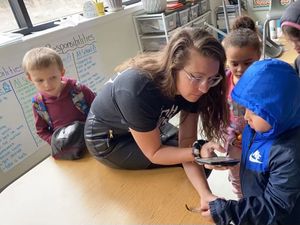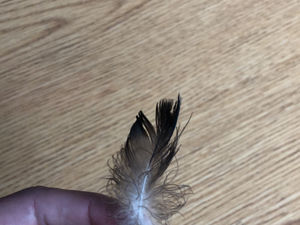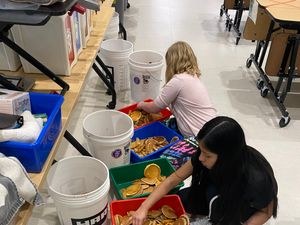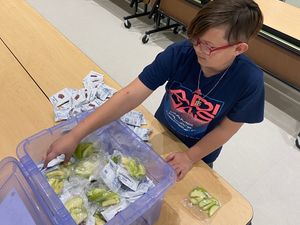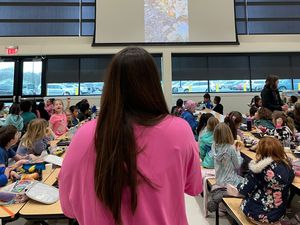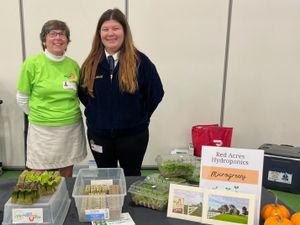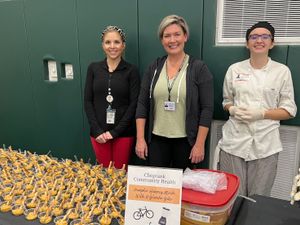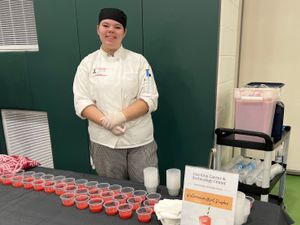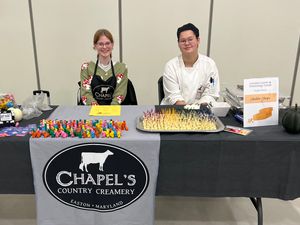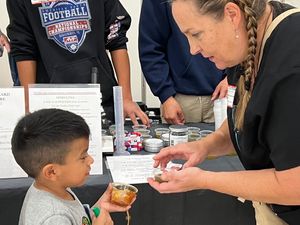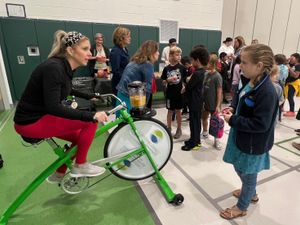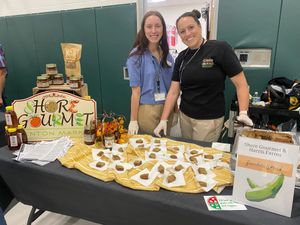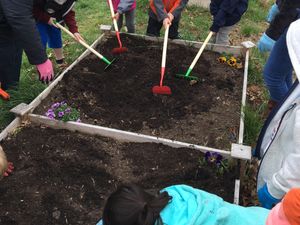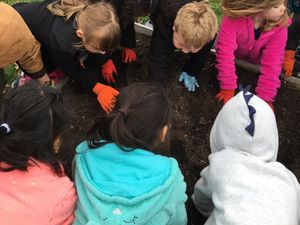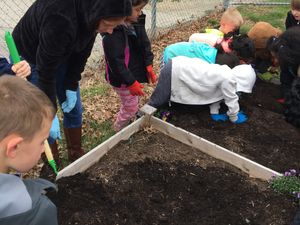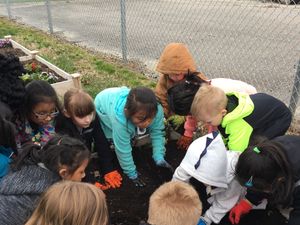Systemic Sustainability
Environmental Curriculum and Instruction
1.1 Curriculum and Instruction
Elementary & middle schools must provide one example of outdoor/environmental instruction per grade level.
High schools must provide one example of outdoor/environmental instruction in four subjects (which may include multiple different differents sciences).
A mobile classroom that enables children to see and work with, hands-on, some environmental grasses and other items from wetlands areas. A mobile classroom that enables children to see and work with, hands-on, some environmental grasses and other items from wetlands areas. This allows students to learn about our area, including the wetlands right behind our school, how it leads to the Choptank River and in turn to the Chesapeake, and the impact that we have on it. We did this every year since 2016 for at least 3 days, one day per grade level. We did this every year since 2016 for at least 3 days, one day per grade level.
Wetlands on Wheels student exploration.
Wetlands on Wheels student presentation.
Wetlands on Wheels student presentation.
Weekly memo notice.
NGSS 3rd G WoW Teacher Introduction Packet 2016 (1.84 MB)
3rd Grade Teacher Packet
NGSS 5th Grade WoW Teacher Introduction Packet 2016 (1.51 MB)
5th Grade Teacher Packet
Pre-kindergarten students are taught the life cycle of the butterfly in their life cycle science unit. Our school provided students with an experience with local caterpillars that were found in a raised garden bed of native plants that the students helped with. When the caterpillars were caught they were brought into the school for all grade levels to observe. Students were able to learn about the native plants that the larvae eat and why native plants are so important, what they need to survive, and what they need to turn into a butterfly. Students are involved in the entire butterfly life cycle, including the final release back into the wild. This is mostly a pre-k activity, but the whole school is able to observe the caterpillars changing into butterflies and the release.
Monarch butterflies (and chrysalises not ready yet) ready to be released into our butterfly garden.
Butterfly release day!
Monarch butterflies (and chrysalises not ready yet) ready to be released into our butterfly garden.
Butterfly release day!
Monarch butterflies (and chrysalises not ready yet) ready to be released into our butterfly garden.
Lesson Plans for Animals More Bugs (Theme 8, Week 4) (1.14 MB)
Lesson Plans and standards that go with the butterfly unit in pre-k.
Our kindergarten teachers partnered with the University of Maryland and their SNAP-Ed program. They came in once a month to teach our students about local fruits and vegetables and their benefits. Students were able to see the process of building a garden, helped to plant and harvest fruits, vegetables, and herbs, and eat them. Students grew and harvested lima beans, strawberries, basil, mint, thyme, sage, carrots, tomatoes, eggplant, corn, peppers, cucumbers, and marigolds. Each year there after we grew our own plants and harvested them. We also planted native plants such as wild carrot and dandelions to show them that "weed" are more than meets the eye. This went along with our living/nonliving unit.
Students harvested native wildflower Queen Anne's Lace (Daucus Carnota) to discover it is actually in the carrot family! Students got to try the wild carrots!
Students digging holes for the plants and seeds to be planted.
Students preparing the raised garden bed for plants.
Students preparing the raised garden bed for plants.
Students preparing the raised garden bed for plants.
Students preparing the raised garden bed for plants.
The Sultana Education Foundation provides hands-on educational opportunities that promote stewardship of the Chesapeake Bay’s historic, cultural, and environmental resources. By helping students of all ages develop an appreciation for the Chesapeake Bay, Sultana is working to create a community of individuals who are dedicated to preserving this irreplaceable treasure.
Welcome sign.
Students learning in the center.
Students learning in the center.
Students learning in the center.
Student learning about local wildlife - terrapin.
Spider on a students head!
Students getting on the Sultana.
Students getting on the Sultana.
Students learning on the Sultana.
Students learning on the Sultana.
Students learning on the Sultana.
Students learning in the center.
Students learning in the center.
Students learning in the center.
Students learning in the center.
Students learning in the center.
Students learning in the center.
Students learning in the center.
Students learning in the center.
Sultana Materials (114.66 KB)
Sultana pre and post trip materials sent to staff to incorporate into teachers' lessons.
We went canoeing to look at native and non-native plants and animals. We tested water quality and discussed human-footprints on the environment. We also took a nature walk and made observations.
Picture of students and teachers canoeing on the Tuckahoe Creek at Tuckahoe State Park which leads into the Choptank River, which leads into the Chesapeake Bay.
Picture of students and teachers canoeing on the Tuckahoe Creek at Tuckahoe State Park which leads into the Choptank River, which leads into the Chesapeake Bay.
Picture of students and teachers canoeing on the Tuckahoe Creek at Tuckahoe State Park which leads into the Choptank River, which leads into the Chesapeake Bay.
Picture of students and teachers canoeing on the Tuckahoe Creek at Tuckahoe State Park which leads into the Choptank River, which leads into the Chesapeake Bay.
Picture of students and teachers canoeing on the Tuckahoe Creek at Tuckahoe State Park which leads into the Choptank River, which leads into the Chesapeake Bay.
Picture of students and teachers canoeing on the Tuckahoe Creek at Tuckahoe State Park which leads into the Choptank River, which leads into the Chesapeake Bay.
Students learning about the bodies of water and the State Park from DNR rangers at the park.
Students learning about the bodies of water and the State Park from DNR rangers at the park.
Students learning about the bodies of water and the State Park from DNR rangers at the park.
Students learning about plant and animal life in the Tuckahoe Creek.
Students learning about plant and animal life in the Tuckahoe Creek.
Students learning about plant and animal life in the Tuckahoe Creek.
Students learning about plant and animal life in the Tuckahoe Creek.
Picture of students and teachers canoeing on the Tuckahoe Creek at Tuckahoe State Park which leads into the Choptank River, which leads into the Chesapeake Bay.
Picture of students and teachers canoeing on the Tuckahoe Creek at Tuckahoe State Park which leads into the Choptank River, which leads into the Chesapeake Bay.
Picture of students and teachers canoeing on the Tuckahoe Creek at Tuckahoe State Park which leads into the Choptank River, which leads into the Chesapeake Bay.
Picture of students and teachers canoeing on the Tuckahoe Creek at Tuckahoe State Park which leads into the Choptank River, which leads into the Chesapeake Bay.
Standards used to write lesson plans for lessons leading up to the Tuckahoe State Park field trip.
On campus we have three bird cameras that are set up through an app that are on student iPads. Students are able to view the cameras either whole group on the projector or on the iPads. Classroom teachers can use the bird cameras to create authentic experiences with their students. The technology teacher introduces the bird cameras to each classroom on their technology day by taking them on a walk outside to see the feeders and box. They can see where the camera are, they learn how to feed the birds and what type of bird feed is used for what type of bird, as well as other animals that visit the feeder such as squirrels and hawks. Classroom teachers then take this resources and implement meaningful experiences for students. For example, multiple grade level teachers take their students outside to sit near the bird feeder to view them while they are outside. Other classroom teachers put the camera on their projector during down time or independent work so students can view the birds. One classroom teacher took her students outside to view the birds at the feeder and then had them come inside and research all the native birds that come to the feeder and the made presentations on their favorite type of bird. Another teacher uses the bird cameras as a center to watch on their iPads and draw what they see. At the center they have bird books and information cards to identify the birds. Other teachers have students use the Merlin app and students take screenshots of the birds they see and input their findings into the Merlin app. We also have the bird camera on live stream at the entrance of our school for community members and families to see.
Students outside observing the bird feeder.
Students outside observing the bird feeder.
Students at a center observing the bird cams and using books and info cards to identify the birds and draw what they see.
Students outside at the bird feeder watching the birds.
Students observing birds through the bird cameras live streamed with the projector.
Technology teacher teaching students what type of birds would or would not be at the feeder and why.
Students observing the bird cams in the classroom and journaling about what they see.
Students observing the bird cams in the classroom.
Students outside at the bird feeder watching the birds.
Owl box and feeders.
Students outside at the bird feeder watching the birds.
Blue Jay nest on the playground that students can observe.
Students outside at the bird feeder watching the birds.
Student journal entry about a red winged black bird they saw and researched.
Student journal entry about a cardinal they saw and researched.
Student projects on birds in Caroline County on display in our hallways.
A female cardinal visiting the bird feeder.
Students seeing that a squirrel has visited the bird feeder!
Students identifying a chickadee at the bird feeder.
Students using books to identify the birds that they see on the bird cam.
Students took a field trip to our Green Schools center Adkins Arboretum. At Adkins we learn about pollinators, seeds and how they travel, life in the forest, and tested the water turbidity. In our curriculum, we have lessons about types of pollinators and the process of pollination, seeds and seed dispersal, and observing living things (plants, animals).
Students learning how to take care of plants.
Students learning outside at Adkins Arboretum.
Students learning about local fish.
32. Lesson 9- Seed Catchers (90.65 KB)
Seed Catchers lesson plans.
36. Lesson 10- Plant Needs (103.49 KB)
Plant Needs lesson plans.
26. Lesson 8- Traveling Seeds (94.98 KB)
Traveling Seeds lesson plans.
12. Lesson 4- Pollinators (73.77 KB)
Pollinators lesson plans.
7. Lesson 2- Animal Habitats (82.63 KB)
Animal Habitats lesson plans.
5th Grade Teachers took the lead but was implemented whole school. All grade levels have been involved in a recycling program here at GES. Lessons are taught on the human impacts of solid waste and then students brain storm ways that we can reduce it.
Recycle bins with signs that have real pictures that students decided on.
Student posters about human impacts on the environment and the importance of recycling.
Student posters about human impacts on the environment and the importance of recycling. We actually stopped using milk cartons in our cafeteria this year and we now use reusable cups.
Student posters about human impacts on the environment and the importance of recycling.
Student posters about human impacts on the environment and the importance of recycling.
Student emptying small classroom recycle bins into the larger ones.
Recycling lesson (486.21 KB)
Lesson plans and standards for recycling program.
Students and staff are able to explore and experience this state of the art technology and then enjoy the tasty vegetables in our cafeteria! Teachers introduced this to their classes and stop by periodically to look at the growth of the plants. It is located outside of the Art room in the same open area as our turtle. The plants are used in the cafeteria for salads and lunch. The tower is also on a timer to make sure the lights and water are turning on and off for the recommended amount of time.
Students in all grade levels participated in a virtual Earth Day during the 2020 shut down.
Earth Day Project (1.04 MB)
Virtual Earth Day Project.
Earth Day Virtual Trip (5.21 MB)
Earth Day Virtual Trip
1.2 Green School Awareness
1.2.1 School Wide Awareness - Staff
Demonstrate that all school personnel are aware of your school's Green School status and application process.
At the beginning of each school year, Green Schools has shared goals and outcomes of the Green Schools application.
Email sent out for teachers to sign up for committees.
Back to School staff meeting where committee outline and expectations were overviewed. This included Green Schools Committee duties and expectations.
1.2.2 School-Wide Celebration
Demonstrate how your school celebrates beig a Green School by hosting a school-wide environmentally-focused event open to all students.
Each year (since before 1990) Greensboro Elementary has celebrated Earth day with a school wide celebration. We invite members of the community and other community stakeholders, such as Parks and Recreation, to come in as well as teacher led activities teaching students about our amazing Earth and what we can do to help take care of it.
Each year (since before 1990) Greensboro Elementary has celebrated Earth day with a school wide celebration. We invite members of the community and other community stakeholders, such as Parks and Recreation, to come in as well as teacher led activities teaching students about our amazing Earth and what we can do to help take care of it. This year we had local farms, Parks and Recreation, Wetlands on Wheels, Fishmobile, Enviroland Tours, Garden Club, Origami Butterflies, Composting, Wolves, Organic Farming, DNR, and Miniature Horse Rescue
Garden Club
Local Farm
Local Farm
DNR
Bees
DNR
DNR Fishing
Garden Club
DNR
Garden Club
Garden Club
DNR
DNR
Mascot
Enviroland Tour
Habitat Restoration
Thank you from administration in the weekly memo.
Save the Date sent out to all staff and community stake holders.
Preparation email sent out to all staff.
Presenters
Student reusing materials to make something new at a station.
Student reusing materials to make something new at a station.
Fishmobile from Phillips Wharf Environmental Center.
Environmental Professional Development for Teachers
1.3.1 Environmental Professional Development for Teachers
Demonstrate that 10% of staff have completed an environmental PD. Instructional staff is defined as any staff that manages a gradebook.
- New Schools must have all PD completed within the past 2 academic years.
- Renewing schools must have all PD completed within the past 4 academic years.
A teacher who has participated in multiple workshops may only be counted once..
Our staff has participated in numerous environmental education professional developments. We have comepletig training from ShoreRivers, MWEE courses, and on site professional developments through our local partners such as the Chesapeake Bay Foundation, Sultana Education Foundation, DNR, Adkin Arboretum, and HornPoint.
On February 17th, 2023, ShoreRivers provided our school staff with a professional development on Place Based Learning and how to incorporate it into our curriculum. Staff participated in a workshop on what Placed Based Learning is and how and when we can use our environmental education resources on our grounds as well as brainstorming breakout time for staff to plan how to incorporate PBL into the curriculum.
Teacher Jam Board of Red Bridges brainstorm.
Screenshot of meeting.
Description of Place Based Education.
Greensboro Christian Park Jam (2.08 MB)
Teacher Jam Board of ideas.
Zoom Grade Level Breakout Rooms - Sheet1 (2) (2.62 KB)
List of attendees.
Place Based Learning Topic_Activity Sign Up (28.86 KB)
Grade level topic sign up that was sent out to teachers and was discussed at team meetings in the weeks prior as teachers looked at their curriculum and chose which topics would best fit in their lessons/curriculum.
MWWE 101 Project Learning Tree - Meaningful Watershed Educational Experience Educator Training Module 1 through Chesapeake Exploration
Course Objectives:
Participants will learn the history of the MWEE and its connections to the Chesapeake Bay Watershed Agreement. Participants will identify how students, teachers, and the community could benefit from a MWEE. Participants will review evidence for how a MWEE can support a variety of learning outcomes. Participants will identify their role in the MWEE Essential Elements and Supporting Practices and how they can incorporate student voice and choice. Participants will evaluate a completed MWEE program.
Amy Phillips MWEE 101 Certificate of Completion_Phillips__20230227124624 (229.79 KB)
Certificate of completion.
MWEE 101 Certificate of Completion_Kneller__20230215114162 (230.94 KB)
Certificate of completion.
NOAA Environmental Science Training Center hosted a virtual professional development opportunity for elementary school teachers (grades K-5) that connects locally relevant environmental science across the curriculum. The workshop is designed to address and support the implementation of core components of the Next Generation Science Standards (NGSS) and Meaningful Watershed Educational Experiences.
Amy Phillips-Elementary Science Certificate of Completion_Phillips (1) (148.28 KB)
Certificate of completion.
Teachers attended a Sultana Education Foundation professional development. SEF professional development programs provide opportunities for teachers to improve core content knowledge, refine pedagogy, and earn required Continuing Professional Development (CPD) credits to keep Maryland teaching certificates current.
Four GES 5th grade teachers, Jen Gunter, Kelly Higgins, Andi Dean, and Emilee Manship, attended a professional development workshop on March 11, 2017 at Horn Point in Cambridge, MD about the Choptank River Ecosystem. To learn more about this ongoing professional development for our 5th grade teachers, please visit the Sultana Education Center.
Recycling PD for Green Schools Committee - trainer of trainers model; trained on what can and cannot be recycled in the state of Maryland and how the materials need to be prepared and collected. Members of the Green Schools committees then took this information and trained their assigned grade level teachers/staff to incorporate into their curriculum and recycling lessons and school wide routines.
Recycling Slides (1.4 MB)
Slides used for recycling PD.
Recycling Bin Sign (745.5 KB)
Signs that were made for recycle bins.
1.4 Achieving Sustainable Schools
1.4.1 School-Wide Staff Sustainability
Demonstrate the sustainability practices your teachers, staff, and other personnel have implemented school-wide to make your school green. Any actions involving students belong under Objective 2.
Staff has been making efforts in decreasing our carbon foot print. Each staff member was given a reusable water bottle for daily use and to bring to staff meetings and celebrations so that we do not use water bottles. We also have purchased compostable utensils and plates/bowls. And in an effort to save paper we switched to electronic sign ins and when mistakes are made on copies we either use the back of the copies, or correct the mistake on the papers, and at the very least reuse or recycle.
An example of a mistake made on school-wide handout that was fixed instead of reprinting all of them.
Email sent to all staff as a reminder to bring their own bottle.
Email Sign-in sheet (150.11 KB)
New digital email sign in system for meetings.
1.4.2 Systemic Partnership
Demonstrate one partnership with a central office or board within the school system that supports part of the Maryland Green Schools Program. Any partnerships outside of your school system belong under Objective 3.
Our school and county has initiated a new Energy Conservation Management Program in a partnership with Cenergistic. The company came in and completed a presentation at our back to school meeting to inform staff about the new goals for energy conservation.
100% compliance (206.33 KB)
Reaching 100% compliance for energy conservation goals.
Student Action
Schools must document eight total actions that address at least three of the listed sustainability practices.
These are student actions not adult actions. Adult sustainable actions can be documented in Objective 1.4.
2.1 Water Conservation/Pollution Prevention
2.1 Water Conservation/Pollution Prevention
Students realize when the water filter needs to be replaced and let the teachers and staff know that the water filter should be replaced. This has sparked many discussions led by students about the importance of clean drinking water. Our water stations have a monitor on them that also let students know how much they are saving. Many conversations prompted by students have come from these about bringing their own water bottle instead of buying water bottles or using the fountain that wastes water.
Students in the environmental club spent months researching native plants and pollinators that would be best to plant in our swales at the school. These marshy depressions collect runoff so students needed to research not only what native plants are best for pollinators, but also which plants could survive best in the wet conditions.
Environmental Club Agenda (52.14 KB)
Agenda for when to research and plant native plants in swales.
Green School Perennial Plants Zone 7 - Sheet1 (52.75 KB)
Native plant research
A mobile classroom that enables children to see and work with, hands-on, some environmental grasses and other items from wetlands areas. This allows students to learn about our area, including the wetlands right behind our school, how it leads to the Choptank River and in turn to the Chesapeake, and the impact that we have on it. We did this every year since 2016 for at least 3 days, one day per grade level.
Wetlands on Wheels student exploration.
Wetlands on Wheels student presentation.
Wetlands on Wheels student presentation.
Weekly memo notice.
NGSS 3rd G WoW Teacher Introduction Packet 2016 (1.84 MB)
3rd grade teacher packet.
NGSS 5th Grade WoW Teacher Introduction Packet 2016 (1.51 MB)
5th grade teacher packet.
Students in all grade levels explore the wetlands behind our school to learn about the importance of taking care of the wetlands and how it leads directly to the Choptank River which leads to the Chesapeake Bay. They learn about native plants and animals and how to protect them. Students have been exploring these wetlands since the school was built.
2.2 Energy Conservation
2.2 Energy Conservation
Students were taught about the importance of saving energy through our lights. In each classroom there is a light monitor who makes sure that lights are turned off or dimmed in each classroom.
Student job posting.
Student doing their job of light monitor.
Student job posting.
Student doing their job of light monitor.
Student with their job posting.
Student job posting.
Student dimming the lights in the classroom.
Student job posting.
Student doing their job as energy saver.
Student with their job posting.
2.3 Solid Waste Reduction
2.3 Solid Waste Reduction
All grade levels have been involved in a recycling program here at GES. Lessons are taught on the human impacts of solid waste and then students brain storm ways that we can reduce it.
Student posters about human impacts on the environment and the importance of recycling.
Student posters about human impacts on the environment and the importance of recycling.
Student posters about human impacts on the environment and the importance of recycling.
Student signage of human impacts. We actually just switched to no milk cartons in the cafeteria and we use reusable cups!
Student emptying small classroom recycle bins into the larger bins.
Recycling lesson (486.21 KB)
Lesson plans for recycling.
Kindergarten successfully got straws banned from GES and other schools in the county. Students researched the impact of solid waste and humans on the environment and after an example from another classroom not using straws and reusable utensils. See attached letter that was sent to the head of food services that got straws banned.
BethStraws (13.48 KB)
Letter that was sent to the head of food services that got straws banned.
After realizing just how much waste create each day with all the food that is thrown away by students. We started helping the cause by collecting all the unopened, packaged items that students intend to throw away (Yogurt, goldfish, string cheese, fruit cups etc.). These items are collected and taken to the office where they are washed and kept in the refrigerator. The following day they are placed on the table in the cafeteria. Students who are still hungry after finishing their meal are welcome to come to the table and select something else to eat. This effort has saved so much food from the landfill, along with giving students an option if they're still hungry. Win win! While that was a great start there is still so much food being thrown away. Students who buy lunch at school are required to take fruits and vegetables as part of their meal. These items get thrown away in huge quantities. As part of our effort to reduce waste and go green we have partnered with two local farms, Work Horse Farm and Winstead Family Farm, and students will be collecting unwanted fruits and vegetables from right before they hit the trash can. All this collected food will be taken to the farm and enjoyed by lots of animals. We anticipate this will make a huge dent in our daily contribution to our landfill. We will also be encouraging students to do their part and not take more than they intend to eat.
Students sorting and weighing food to be taken to the farm.
Students sorting food to be recycled.
Students sorting and weighing food to be taken to the farm.
Students sorting food to be recycled.
Video of animals at the farm eating our leftover food being shared with all students during lunch time.
Food Recyling (218.44 KB)
Food recycling staff email.
Food Recyling Email Week 1 (1.5 MB)
Over 43 lbs of food was saved from the trash yesterday and taken to the farm!!! Yay us!
Food recycling update (866.32 KB)
Update with pictures from the farm!
Food Recyling Update week 2 and 3 (152.32 KB)
Weeks 2 and 3 updates!
Breakfast Leftovers email 2 (1.26 MB)
New initiative where students bring their leftover breakfast food in bins to be taken to the farm!
At GES we have all grade levels recycle markers, pens and caps, watercolor paint trays, and more through Crayola Recycling program and the BIC Stationary Recycling Program. We have recycle bins specifically for these items that get boxed up and shipped back to the companies.
One of our stationary recycle bins.
Boxed stationary ready to be weighed and shipped!
Chat establishing enrolling in the new BIC recycling program.
ColorCycle_Parents_LetterV1 (99.69 KB)
Letter to families.
2.4 Habitat Restoration
2.4 Habitat Restoration
The National Aquarium selected 42 Maryland schools from among many applicants to raise Poplar Island’s summer hatchling crop. Teachers and students will care for them over the school year and return them to Poplar Island the following spring. While teachers present textbook lessons, students learn about terrapins by feeding, caring, and measuring them. Terrapins in the Classroom is one of many National Aquarium programs that provide unique, hands-on opportunities for students to form meaningful connections to the Chesapeake Bay ecosystem. It joins the Terrapin Education and Research Partnership (TERP) sponsored by MDOT MPA in a common goal to inspire the next generation of conservationists based on a belief that education leads to inspiration and conservation. We have been doing this program for two year, we have had two hatchlings. Each Tuesday we hold turtle talk where a group of students comes to the tank and learns about the turtle, measures them, and helps to feed them. On release day, we watch a live feed of the release!
A student observing the turtle.
Check up day.
Email invitation of the live stream release.
Poplar Island where the turtles get released.
Turtle talk with all grade levels every Tuesday.
Bubbles progress (1.19 MB)
Progress monitoring that is shared with students.
Pre-kindergarten students are taught the life cycle of the butterfly in their life cycle science unit. Our school provided students with an experience with local caterpillars that were found in a raised garden bed of native plants that the students helped with. When the caterpillars were caught they were brought into the school for all grade levels to observe. Students were able to learn about the native plants that the larvae eat and why native plants are so important, what they need to survive, and what they need to turn into a butterfly. Students are involved in the entire butterfly life cycle, including the final release back into the wild. This is mostly a pre-k activity, but the whole school is able to observe the caterpillars changing into butterflies and the release.
Monarch butterfly and chrysalises.
Butterfly release day!
Monarch butterfly and chrysalises.
Butterfly release day!
Monarch butterflies (and chrysalises not ready yet) ready to be released into our butterfly garden.
Lesson Plans for Animals More Bugs (Theme 8, Week 4) (1.14 MB)
Lesson plans and standards for butterfly unit that go with the raise and release.
Students found a Killdeer nest on the playground by the swings and reported it to a teacher that it needed to be protected. The area around the swing set were then off limits for play and students were able to protect the Killdeer nest while observing during recess as well as from their classrooms and taking a filed trip outside to observe. Students were about to learn about Killdeer as well as their predators such as fox and hawks that were also observed.
2.5 Opportunities for Nature Exploration
2.5 Opportunities for Nature Exploration
Students in the Therapeutic Support Program researched and built birdhouses that would house native birds on our school property. These bird houses are now used for outdoor education and learning spaces where students can identify, feed, and observe local birds.
The National Aquarium selected 42 Maryland schools from among many applicants to raise Poplar Island’s summer hatchling crop. Teachers and students will care for them over the school year and return them to Poplar Island the following spring. While teachers present textbook lessons, students learn about terrapins by feeding, caring, and measuring them. Terrapins in the Classroom is one of many National Aquarium programs that provide unique, hands-on opportunities for students to form meaningful connections to the Chesapeake Bay ecosystem. It joins the Terrapin Education and Research Partnership (TERP) sponsored by MDOT MPA in a common goal to inspire the next generation of conservationists based on a belief that education leads to inspiration and conservation. We have been doing this program for two year, we have had two hatchlings. Each Tuesday we hold turtle talk where a group of students comes to the tank and learns about the turtle, measures them, and helps to feed them. On release day, we watch a live feed of the release!
Check up day!
Turtle talk with all grade levels every Tuesday.
Email invitation of the live stream release.
Student observing the turtle.
Bubbles progress (1.19 MB)
Progress monitoring that is shared with students.
On campus we have three bird cameras that are set up through an app that are on student iPads. Students are able to view the cameras either whole group on the projector or on the iPads. Classroom teachers can use the bird cameras to create authentic experiences with their students. The technology teacher introduces the bird cameras to each classroom on their technology day by taking them on a walk outside to see the feeders and box. They can see where the camera are, they learn how to feed the birds and what type of bird feed is used for what type of bird, as well as other animals that visit the feeder such as squirrels and hawks. Classroom teachers then take this resources and implement meaningful experiences for students. For example, multiple grade level teachers take their students outside to sit near the bird feeder to view them while they are outside. Other classroom teachers put the camera on their projector during down time or independent work so students can view the birds. One classroom teacher took her students outside to view the birds at the feeder and then had them come inside and research all the native birds that come to the feeder and the made presentations on their favorite type of bird. Another teacher uses the bird cameras as a center to watch on their iPads and draw what they see. At the center they have bird books and information cards to identify the birds. Other teachers have students use the Merlin app and students take screenshots of the birds they see and input their findings into the Merlin app. We also have the bird camera on live stream at the entrance of our school for community members and families to see.
Students observing bird cameras on the projector in the classroom.
Students observing bird cameras on the projector in the classroom.
Students observing bird cameras on the projector in the classroom.
Students at a center with the bird cameras and bird books and info cards drawing what they see.
Students outside observing the birds at the feeders.
Students outside observing the birds at the feeders.
Students outside observing the birds at the feeders.
Students outside observing the birds at the feeders.
After observing the birds outside at the feeder, students researched all the native birds that come to the feeder and the made presentations on their favorite type of bird.
Example of student research project.
Student journal entry about a red wing black bird they saw and researched.
Student journal entry about a cardinal they saw and researched.
Owl box and feeder.
Students outside observing the birds at the feeders.
Blue jay nest on the playground.
Students outside observing the birds at the feeders.
Students observing the bird cam in the classroom.
Technology teacher teaching students what types of birds would and would not visit the feeder and why.
Students outside observing the birds at the feeders.
Students journaling about what they are observing on the bird cam.
Student projects on birds in Caroline County on display in our hallways.
Video of bird visiting the feeder.
Students finding that a squirrel has visited the bird feeder!
Students uses books to identify birds they see on the bird cams.
Students identifying chickadees on the bird cam.
Students in 3rd, 4th, and 5th grade are in an environmental club where they learn about sustainable practices and how to take care of our environment and implement those practices on our school grounds and at their homes and in their community.
Email sent to staff about club and how to save paper when sending it out.
Flyer in English.
Flyer in Spanish.
Environmental Club Agenda (52.14 KB)
Agenda for all meetings and list of students.
2.6 Responsible Transportation
2.6 Responsible Transportation
Our school initiated No Idle Zones for cars parked waiting to pick-up and drop-off their students. Students in all grade levels created their own signs after studying the effects of pollution from transportation. Student signage from each grade level was put up where everyone within the no idle zone can see.
No-Idle Initiative (45 KB)
After students researched and discussed pollution and the benefits of no idle zones along with the student signage, the new program was put into our weekly memo and sent out to families.
idle_free_schools_flyer (143.22 KB)
Flyer shared with staff and families.
2.7 Healthy Indoor Environments
2.7 Healthy Indoor Environments
Our kindergarten teachers partnered with the University of Maryland and their SNAP-Ed program. They came in once a month to teach our students about local fruits and vegetables and their benefits. Students were able to see the process of building a garden, helped to plant and harvest fruits, vegetables, and herbs, and eat them. Students grew and harvested lima beans, strawberries, basil, mint, thyme, sage, carrots, tomatoes, eggplant, corn, peppers, cucumbers, and marigolds. Each year there after we grew our own plants and harvested them. We also planted native plants such as wild carrot and dandelions to show them that "weed" are more than meets the eye. This went along with our living/nonliving unit.
Students harvested native wildflower Queen Anne's Lace (Daucus Carnota) to discover it is actually in the carrot family! Students got to try the wild carrots!
Students digging holes for the plants and seeds to be planted.
Students digging holes for the plants and seeds to be planted.
Students preparing the raised garden bed for plants.
Students digging holes for the plants and seeds to be planted.
Students digging holes for the plants and seeds to be planted.
2.8 Citzen/Community/Participatory Science
2.8 Citizen/Community/Participatory Science
Students using iNaturalist and Seek to identify plants on their play ground. Students use their devices and the seek app to identify certain plants on/around our school grounds. In this example, a kindergarten student was curious if a type of berry was poisonous so they looked it up! They also wanted to know the name of the flowers that were growing and the birds at our bird feeder. We found asters, tufted titmouse, cardinal, sparrows, and blue jays! Students sat a a picnic table a drew what they saw!
Screenshot of Seek app finding.
Students outside observing their surroundings and drawing what they find.
Aster that students found and identified.
Staff Device Numbers - Sheet1 (54.38 KB)
Staff device numbers collected so that iNaturalist, Seek, Merlin, Rock Identifier, and the bird cams could be put on the for student use to identify things in nature.on our school grounds.
Students found a feather on the playground and used the iNaturalist app to try and find what bird it came from.
Students found a feather on the playground and used the Seek app to try and find what bird it came from.
Community Partnership
Demonstrate that your school is forming long-term partnerships to foster environmental stewardship and cultivate community wellness through real-world connections.
3.1 Community Partnerships
3.1.1 School Active in Community
Describe at least one environmentally-focused partnership in which your school is working to benefit your community.
After realizing just how much waste create each day with all the food that is thrown away by students. We started helping the cause by collecting all the unopened, packaged items that students intend to throw away (Yogurt, goldfish, string cheese, fruit cups etc.). These items are collected and taken to the office where they are washed and kept in the refrigerator. The following day they are placed on the table in the cafeteria. Students who are still hungry after finishing their meal are welcome to come to the table and select something else to eat. This effort has saved so much food from the landfill, along with giving students an option if they're still hungry. Win win! While that was a great start there is still so much food being thrown away. Students who buy lunch at school are required to take fruits and vegetables as part of their meal. These items get thrown away in huge quantities. As part of our effort to reduce waste and go green we have partnered with two local farms, Work Horse Farm and Winstead Family Farm, and students will be collecting unwanted fruits and vegetables from right before they hit the trash can. All this collected food will be taken to the farm and enjoyed by lots of animals. We anticipate this will make a huge dent in our daily contribution to our landfill. We will also be encouraging students to do their part and not take more than they intend to eat.
Students sorting and weighing food to be taken to the farm.
Students sorting food to be recycled.
Students sorting and weighing food to be taken to the farm.
Students sorting food to be recycled.
Video of animals at the farm eating our leftover food being shared with all students during lunch time.
Food Recyling (218.44 KB)
Food recycling staff email.
Food Recyling Email Week 1 (1.5 MB)
Over 43 lbs of food was saved from the trash yesterday and taken to the farm!!! Yay us!
Food recycling update (866.32 KB)
Update with pictures from the farm!
Breakfast Leftovers email 2 (1.26 MB)
New initiative where students bring their leftover breakfast food in bins to be taken to the farm!
Food Recyling Update week 2 and 3 (152.32 KB)
Weeks 2 and 3 updates!
3.1.2 Community Active in the School
Describe at least one partnership in which a community partner is benefitting the school. These actions and projects occur on or near school grounds with support from the partner.
MSDE and GES Hosted a Farm to School Week with numerous community partners including: • University of Maryland SNAP-Ed • Choptank Community Health • Caroline Career and Technology Center • Chapel's Country Creamery • Chesapeake Culinary Center • Red Acres Hydroponics • Blade's Orchard • Rink2Reef Oyster Habitat Rehabilitation • Clayton Farms • Shore Gourmet • Maryland FFA Association • Bailey and Sons Dairy • Bartenfelder and Schafer Farms
Each class was able to go through and meet each community partner and learn about AND TRY the local foods that our community provides as well as a very cool demonstration from Rink2Reef about why oyster bed are an important habitat within a healthy estuary. They used recycled lacrosse sticks to rebuild the reefs that will provide essential habitat for oysters and many other species including shrimp, clams, crabs, snails and a variety of fish. There was also a demonstration on how much energy can be harnessed from a bike! As they rode they bike they were running a blender to make a smoothie! They were given resources at each station and info cards and/or recipes for the food they tried.
This event is a testament to how these partners are active in our school each and every day. We serve their local produce and proteins in our cafeteria to students and staff, they provide our students with invaluable information on the importance of eating local foods, and provide our staff and students with meaningful experiences. They come to more events than just this including but not limited to Earth Day and Career Day.
Rink2Reef Demonstration
Red Acres Hydroponics
Blades Orchards with local apple donuts
Choptank Community Health with pumpkin hummus
Bartenfelder and Schafer Farms local watermelon
Chapel Country Creamery
FFA presentation about local fruits and vegetables
Shore Gourmet zucchini bread with local honey and jam
Local Applesauce
Bailey and Sons local milk
Students trying local greens
Students trying local dairy
Student trying spirulina
Local grown foods being served and eaten in our cafeteria (this is every day)
Bike energy demonstration
Red Acre Hydroponics
UMD SNAP-Ed
Clayton farms local cucumbers
Shore Gourmet
Student trying Maryland crab soup.
Email thanks all staff and partners for a great turn out.
Our kindergarten teachers partnered with the University of Maryland and their SNAP-Ed program. They came in once a month to teach our students about local fruits and vegetables and their benefits. Students were able to see the process of building a garden, helped to plant and harvest fruits, vegetables, and herbs, and eat them. Students grew and harvested lima beans, strawberries, basil, mint, thyme, sage, carrots, tomatoes, eggplant, corn, peppers, cucumbers, and marigolds. Each year there after we grew our own plants and harvested them. We also planted native plants such as wild carrot and dandelions to show them that "weed" are more than meets the eye. This went along with our living/nonliving unit.
Students harvested native wildflower Queen Anne's Lace (Daucus Carnota) to discover it is actually in the carrot family! Students got to try the wild carrots!
Students preparing the raised garden bed for plants.
Students digging holes for the plants and seeds to be planted.
Students digging holes for the plants and seeds to be planted.
Students preparing the raised garden bed for plants.
Students digging holes for the plants and seeds to be planted.
3.2 Additional Achievements
3.2 Additional Achievements optional
Share any environmentally-related awards, special recognition, certifications, or other achievements that your school, staff or students have accomplished.
GES was recognized for our Green Schools Certification in the Times Record Newspaper.
https://www.myeasternshoremd.com/times_record/schools/greensboro-elementary-awarded-state-honor/article_64e7ff93-2585-53fc-94b0-95d59ea427ba.html
article_64e7ff93-2585-53fc-94b0-95d59ea427ba (471.27 KB)
https://www.myeasternshoremd.com/times_record/schools/greensboro-elementary-awarded-state-honor/article_64e7ff93-2585-53fc-94b0-95d59ea427ba.htmlhttps://www.myeasternshoremd.com/times_record/schools/greensboro-elementary-awarded-state-honor/article_64e7ff93-2585-53fc-94b0-95d59ea427ba.html


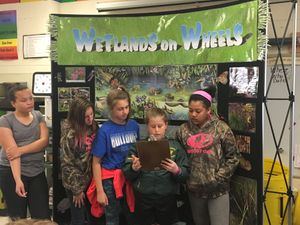



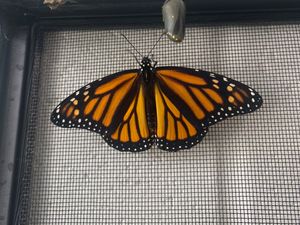
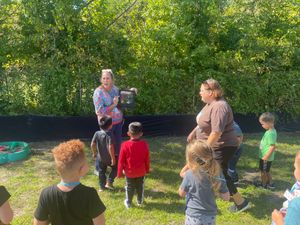
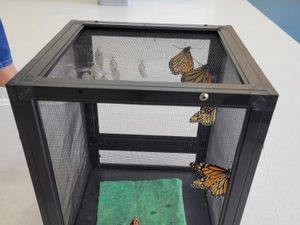
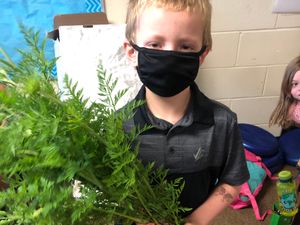
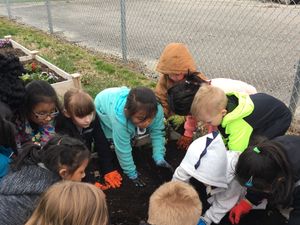

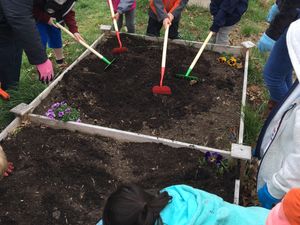






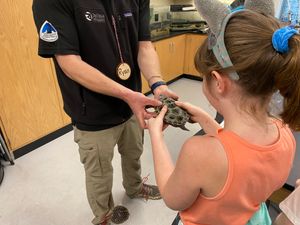


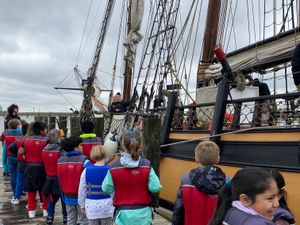


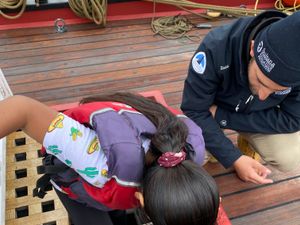
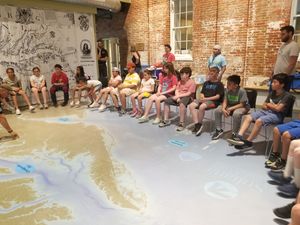
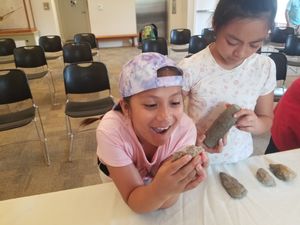
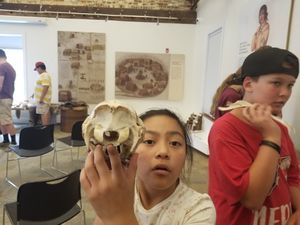

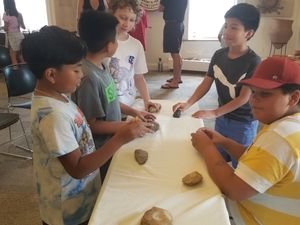




__20230303125573.jpg)




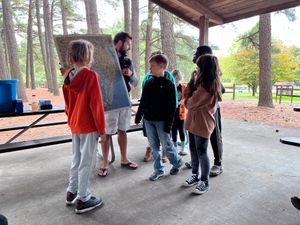
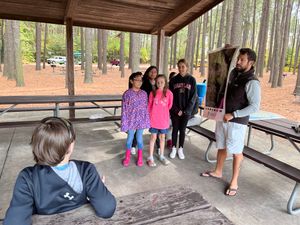
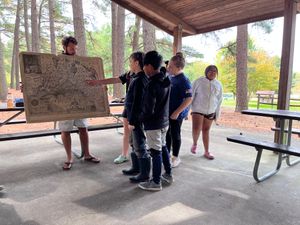












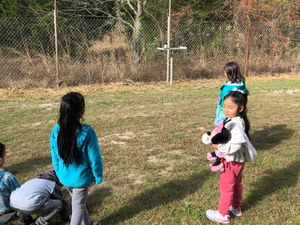

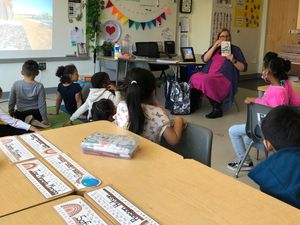







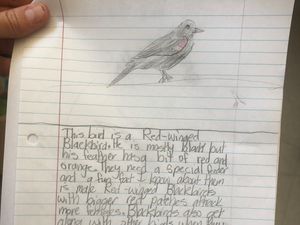
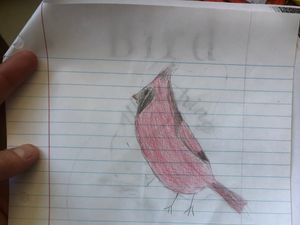
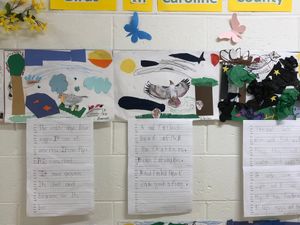

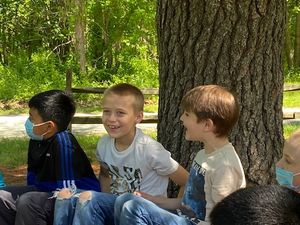
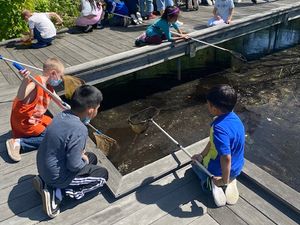
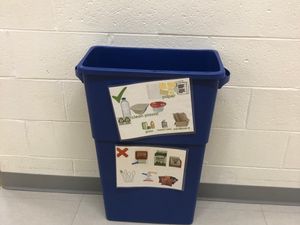
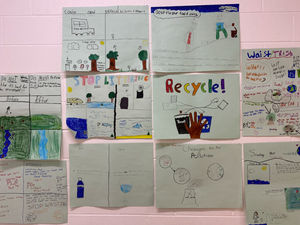







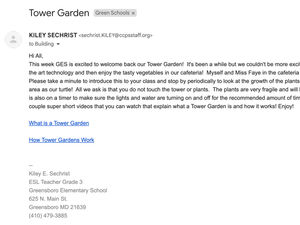


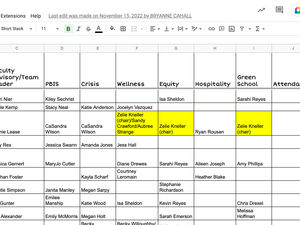
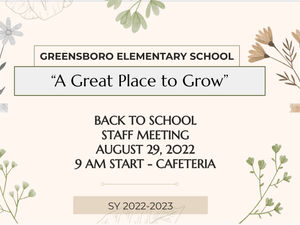
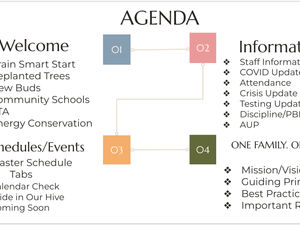


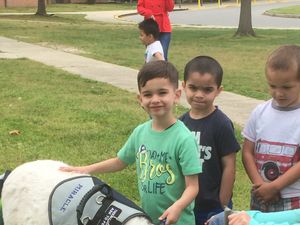



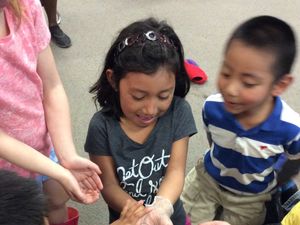
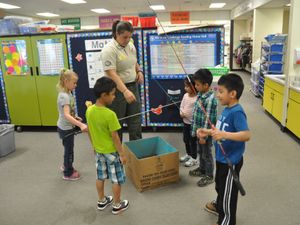
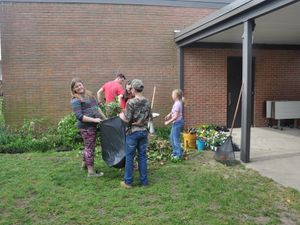




__20230223120496.JPG)











